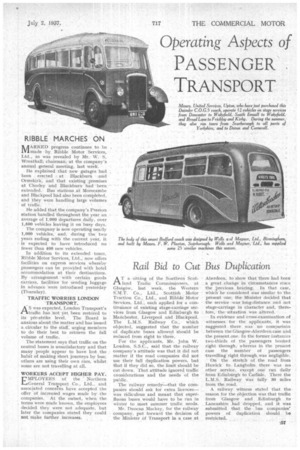Rail Bid to Cut Bus Duplication
Page 103

If you've noticed an error in this article please click here to report it so we can fix it.
A T a sitting of the Southern Scott-% land Traffic Commissioners, at Glasgow, last week, the Western S.M.T. Co., Lid., Scottish Motor Traction Co., Ltd., and Ribble Motor Services,. Ltd., each applied for a contintiance of existing stage-carriage see
' vices from Glasgow and Edinburgh to • Manchester, Liverpool and 131ackpool. The L.M.S. Railway Co., which objected, suggested that the number • of duplicate hoses allowed should be reduced from eight to three.
For the applicants, Mr. John W. Loudon, S.S.C., said that the railway company's attitude was that it did not matter if the road companies did not use their full duplication powers, but that if they did so, the limit should be cut down. That attitude ignored traffic considerations and the needs of the public.
The 'railway remedy—that the companies should ask for extra licences— was ridiculous and meant that superfluous buses, would have to be run in winter to meet summer traffic needs. . Mr. Duncan Mackay, for the railway company, put forward the decision of the Minister of Transport in a case at Aberdeen, to 'show that there had been' a great change in -circumstances since the .previous hearing. In that case, which he considered was similar to the present -one-, the -Minister 'decided that the service was long,distance and not stage-carriage in character arid, there fore,. thesituation was altered. .
rft evidence and eros.4-exannuation of witnesses for the applic.arits, it was suggested there was no cornparisem between the' Glasgow-Aberdeen ease and the present.one. In the forrricr instances two-thirds of the passengers booked tight through, whereas in the present case the number of passengers -travelling' right through.was
On the stretch of the road from Hawick to Langholm there was no other service, except one run daily from Edinburgh to Carlisle. There the L.M.S. Railway Was fully 30 miles from the road.
A railway witness stated that the reason for the objection was that traffic from Glasgow and Edinburgh to Lancashire had dropped, and it Was submitted, that the bus companies' powers of duplication should be restricted. . . .




















































































































































